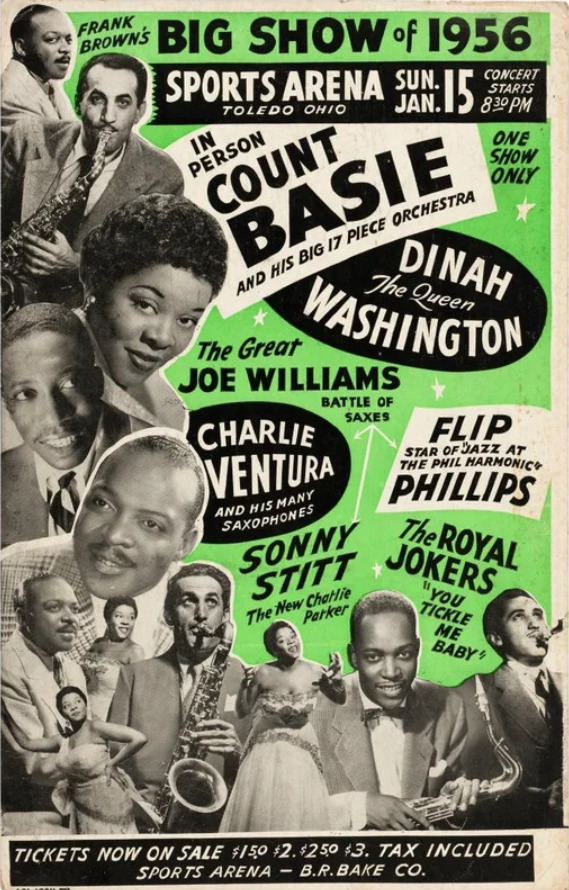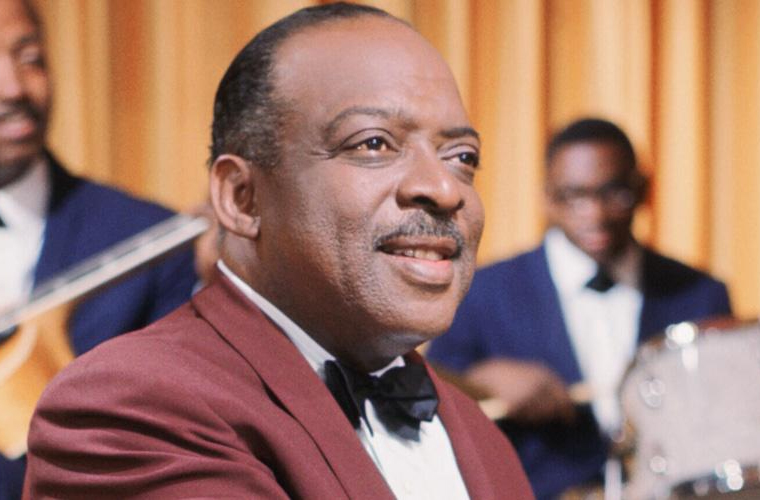A pianist, Count Basie played vaudeville before eventually forming his own big band and helping to define the era of swing with hits like “One O’Clock Jump” and “Blue Skies.” In 1958, Basie became the first African American male recipient of a Grammy Award. One of jazz music’s all-time greats, he won many other Grammys throughout his career and worked with a plethora of artists, including Joe Williams and Ella Fitzgerald.
Basie was born William James Basie (with some sources listing his middle name as “Allen”) on August 21, 1904, in Red Bank, New Jersey. His father Harvey was a mellophonist and his mother Lillian was a pianist who gave her son his first lessons. After moving to New York, he was further influenced by James P. Johnson and Fats Waller, with Waller teaching Basie organ-playing techniques.
Basie played the vaudevillian circuit for a time until he got stuck in Kansas City, Missouri in the mid-1920s after his performance group disbanded. He went on to join Walter Page’s Blue Devils in 1928, which he would see as a pivotal moment in his career, being introduced to the big-band sound for the first time.
He later worked for a few years with a band led by Bennie Moten, who died in 1935. Basie then formed the Barons of Rhythm with some of his bandmates from Moten’s group, including saxophonist Lester Young. With vocals by Jimmy Rushing, the band set up shop to perform at Kansas City’s Reno Club.

During a radio broadcast of the band’s performance, the announcer wanted to give Basie’s name some pizazz, keeping in mind the existence of other bandleaders like Duke Ellington and Earl Hines. So he called the pianist “Count,” with Basie not realizing just how much the name would catch on as a form of recognition and respect in the music world.
Producer John Hammond heard the band’s sound and helped secure further bookings. After some challenges, the Count Basie Orchestra had a slew of hits that helped to define the big-band sound of the 1930s and ’40s. Some of their notable songs included “One O’Clock Jump”—the orchestra’s signature tune which Basie composed himself — and “Jumpin’ at the Woodside.”
With the group becoming highly distinguished for its soloists, rhythm section, and style of swing, Basie himself was noted for his understated yet captivating style of piano playing and precise, impeccable musical leadership. He was also helping one of the biggest, most renowned African American jazz groups of the day.
Due to changing fortunes and an altered musical landscape, Basie was forced to scale down the size of his orchestra at the start of the 1950s, but he soon made a comeback and returned to his big-band structure in 1952, recording new hits with vocalist Joe Williams and becoming an international figure. Another milestone came with the 1956 album April in Paris, whose title track contained psyche-you-out endings that became a new band signature.
During the 1960s and ’70s, Basie recorded with luminaries like Ella Fitzgerald, Frank Sinatra, Sammy Davis Jr., Jackie Wilson, Dizzy Gillespie, and Oscar Peterson. Basie ultimately earned nine Grammy Awards over the course of his career, but he made history when he won his first, in 1958, as the first African American man to receive a Grammy. A few of his songs were inducted into the Grammy Hall of Fame as well, including “April in Paris” and “Everyday I Have the Blues.”
Basie suffered from health issues in his later years, and died from cancer in Hollywood, Florida, on April 26, 1984. He left the world an almost unparalleled legacy of musical greatness, having recorded or been affiliated with dozens upon dozens of albums during his lifetime.

